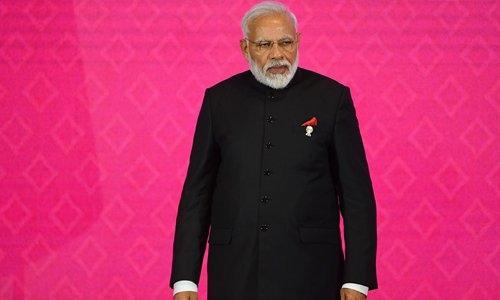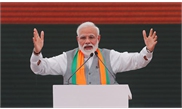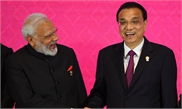
India's Prime Minister Narendra Modi attends the 3rd Regional Comprehensive Economic Partnership (RCEP) Summit in Bangkok on November 4, 2019. Photo: VCG
India on Monday night took a surprise move as it backed out of a historic deal by fellow Asia-Pacific nations to wrap up years-long negotiations for what is said to be the world's largest free trade pact, apparently caving into growing domestic opposition and economic nationalistic sentiments.
Following meetings with leaders of the Regional Comprehensive Economic Partnership (RCEP) member states in Bangkok, Thailand, Indian Prime Minister Narendra Modi announced that India would not join the RCEP deal, claiming that India's concerns were not addressed.
"The present form of the RCEP Agreement does not fully reflect the basic spirit and the agreed guiding principles of the RCEP. It also does not address satisfactorily India's outstanding issues and concerns. In such a situation, it is not possible for India to join RCEP Agreement," Modi was quoted by the Press Trust of India (PTI) as saying.
Modi's comment came shortly after the other 15 member states decided that they would move forward with the trade pact, announcing in a joint statement that they had concluded negotiations for the texts and market access issues and plan to ink the deal in 2020, despite India's unresolved issues.
But the joint statement left the door open for continued negotiations with India, saying that "all RCEP Participating Countries will work together to resolve these outstanding issues in a mutually satisfactory way."
Indian officials took a step further, as they struck a more critical and even a nationalistic tone in explaining their decision to back away from the RCEP. "Gone are the days when Indian negotiators caved-in to pressures from the global powers on trade issues," unnamed government sources told PTI.
Such statements echoed growing nationalistic and protectionist sentiment in India toward the RCEP, as many claimed that signing of the deal would open the Indian market to foreign imports and hurt the domestic industries.
Some Indian media reports even singled out China as being forceful in pushing forward the deal, accusations Chinese analysts said were baseless, as 14 other member states also went along with the move.
Short-sighted move
Despite the dramatic turn of events on Monday, many in China believe that India's move was not a big surprise and that it will not affect the progress of the bloc, which includes China, Japan, South Korea, Australia, New Zealand and the 10 member countries of the Association of Southeast Asian Nations (ASEAN).
"It's a shortsighted move, as it has not fully taken long-term development prospects into account," Tian Guangqiang, assistant research fellow with the National Institute of International Strategy at the Chinese Academy of Social Sciences, told the Global Times on Monday.
Tian said that India was concerned because, given its weak manufacturing, lower tariffs under the RCEP would make its industries even more vulnerable at regional and global competitions.
But for countries pursuing long-term growth, they should open up their market, helping the domestic market become more competitive. But Modi focuses more on the short-term economic performance by protecting Indian manufacturing and other local industries, as more tariffs mean more protection, Tian noted.
Nationalism and political divergence are depriving India of the dividend the RCEP is to offer. India has a lot to learn from China which has grown increasingly stronger as it firmly pursues opening-up and does not waver from external competition, analysts said.
Leading the opposition to the RCEP was India's agricultural and manufacturing sectors, while industry bodies, such as the Confederation of Indian Industry (CII), backed the trade agreement. The CII warned on Monday that India not being part of the RCEP would hinder its investments from many countries and its integration into regional and global industrial chains.
While India's commodity trade may not have clear advantages, signing up to the RCEP would boost its services trade, according to Liu Xiaoxue, an associate research fellow at the Chinese Academy of Social Sciences' National Institute of International Strategy. "For the RCEP, India is active in boosting services trade terms because it has advantage in this sector," he said.
No effect on RCEP
Though India did not state clearly whether it would continue negotiations with the RCEP countries, its decision on Monday night would not affect the progress of the trade pact, analysts said. Some even argued that without India, things could move along more smoothly, as India was the biggest sticking point in the entire negotiation process.
India's decision not to join the RCEP won't hinder other 15 countries from pushing forward this regional cooperation pact which would be the world's largest economic bloc, Long Chunxing, director of the Center for Indian Studies at China West Normal University, told the Global Times on Monday. "If India changes its idea one day, it could join later."
Against the backdrop of a fast-changing global environment, the completion of the RCEP negotiations will demonstrate "our collective commitment to an open trade and investment environment across the region," according to a joint leaders' statement on the RCEP issued on Monday.
And 15 countries have concluded text-based negotiations for all 20 chapters and essentially all their market access issues, expecting to sign the pact in 2020.




